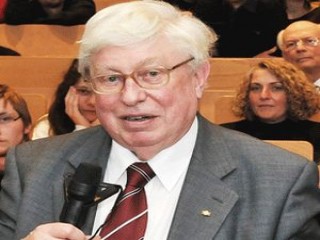
Gerhard Ertl biography
Date of birth : -
Date of death : -
Birthplace : Bad Cannstadt, Germany
Nationality : German
Category : Science and Technology
Last modified : 2011-09-16
Credited as : chemist, semiconductors, Nobel Prize for Chemistry
0 votes so far
Gerhard Ertl won the 2007 Nobel Prize for Chemistry. He was one of the first scientists to concentrate on the new field of semiconductors, and developed the methodology for modern surface chemistry, which uses high-vacuum experiments to observe the behavior of atoms and molecules on the uncontaminated surface of a metal. Ertl refined the Haber-Bosch process (which won earlier Nobels for Fritz Haber and Carl Bosch) wherein ammonia for artificial fertilizer is created from nitrogen and hydrogen on an iron surface. He has also studied oxidation of carbon monoxide on platinum, and the catalytic oxidation of carbon monoxide over palladium. He determined that chemical reactions on the surfaces of tiny ice crystals in the stratosphere cause damage to the Earth's protective ozone layer, and his work has advanced scientific understanding of why iron rusts, how fuel cells function, and how to clean auto emissions. Coincidentally, Ertl's Nobel honors were announced on his 71st birthday.
Ertl was born in Stuttgart, Germany, where he studied physics from 1955 to 1957 at the Technical University of Stuttgart and then at the University of Paris (1957-1958) and Ludwig Maximilians University in Munich (1958-1959). He completed his Diplome in Physics at the Technical University of Stuttgart in 1961, followed his thesis advisor Heinz Gerischer from the Max Planck Institute for Metals Research in Stuttgart to Munich and received his Ph.D. degree from the Technical University of Munich in 1965.
He always used new observation techniques like low-energy electron diffraction (LEED) at the beginning of his career, later ultraviolet photoelectron spectroscopy (UPS) and scanning tunneling microscope (STM) yielding ground breaking results. He won the Wolf Prize in Chemistry in 1998 along with Gabor A. Somorjai of the University of California, Berkeley for "their outstanding contributions to the field of the surface science in general and for their elucidation of fundamental mechanisms of heterogeneous catalytic reactions at single crystal surface in particular."
Gerhard Ertl was awarded the 2007 Nobel Prize in Chemistry for his studies of chemical processes on solid surfaces. The award, worth SEK 10 million (US$1.7 million, GB£1.15 million), was announced on Ertl's 71st birthday. "I am speechless", Ertl told Associated Press from his office in Berlin. "I was not counting on this."
Awards and honors:
Japan Prize 1992
Wolf Prize in Chemistry 1998 (with Gabor A. Somorjai)
Nobel Prize for Chemistry 2007
American Academy of Arts and Sciences
Austrian Academy of Sciences 2001
German Academy of Sciences 1986
National Academy of Sciences 2004 (Foreign Member)
Royal Society of Edinburgh
















